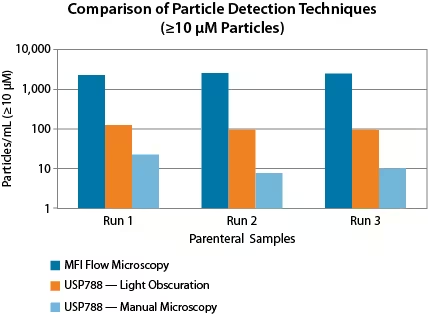Sponsored Content by Bio-TechneReviewed by Olivia FrostJan 8 2024
Reduce recall risk with MFI
In 2016, the FDA identified particulate matter contamination as the second leading cause of product recalls. Current contaminant detection techniques, such as light obscuration (LO), are restricted in their ability to identify all particulate matter.
This is due to the highly translucent nature of protein aggregates, meaning they are often overlooked by compendial methods. Research conducted by the National Institute of Standards and Technology has revealed that LO is less sensitive to particles with a refractive index closely matched to the surrounding matrix. This results in under-counting and under-sizing of protein aggregates.

Figure 1. MFI can detect more sub-visible particles compared to pharmacopeial methods such as Light Obscuration and Manual Microscopy. Because MFI's novel imaging technology is more sensitive, it can see the translucent protein particles that these older methods can miss. Image Credit: Bio-Techne
Why MFI?
Micro-Flow Imaging™ provides digital microscopy's direct imaging capabilities with the precise control found in microfluidics. This allows for complete imaging of what passes through the flow cell. The translucent protein aggregates missed by LO are caught by MFI.
Morphology is derived from these images and is utilized to distinguish particle populations in the sample, including silicon oil, protein aggregates, and other contaminates. MFI is a more sensitive detection method and offers the ability to separate non-protein from protein. MFI thus provides the most comprehensive profile of particles in the sample.

Figure 2. MFI’s high sensitivity allows it to detect translucent particles, like protein aggregates, that are invisible to traditional methods like Light Obscuration. Its image-based approach allows MFI to distinguish between different particle populations within a sample, including protein aggregates, silicon oil, and other contaminants. Image Credit: Bio-Techne
Seeing Beyond Light Obscuration with Micro-Flow Imaging
Video Credit: Bio-Techne
What others are saying about MFI?
"MFI technology has allowed us to better understand what conditions promote stability of our therapeutic molecules, which ensures that only world-class medicines are delivered to patients," says Stephanie Davies, Ph.D., Formulation Sciences, MedImmune.
"We are able to do extended analysis with images provided by MFI and then bridge this data with other techniques to identify and rapidly classify particles in solution. This helps our clients understand their products better and ensure they are providing the highest quality product to their patients,” says Amber Fradkin, Ph.D., Associate Director, Particle Characterization Core Facility, KBI Biopharma.
About Bio-Techne
Bio-Techne Corporation is a leading developer and manufacturer of high-quality purified proteins - notably cytokines and growth factors, antibodies, immunoassays, as well as biologically active small molecule compounds - which are sold to biomedical researchers and clinical research laboratories; these operations constitute the core Biotech Division, headquartered in Minneapolis, Minnesota.
The Protein Platform Division manufactures innovative protein analysis tools under the ProteinSimple brand name that greatly automate western blotting and immunoassay practices. The Diagnostics Division manufactures FDA-regulated controls, calibrators, blood gas, and clinical chemistry controls for OEM customers and clinical customers. Bio-Techne products assist scientific investigations into biological processes and the nature and progress of specific diseases. They aid in drug discovery efforts and provide the means for accurate clinical tests and diagnoses.
With thousands of products in its portfolio, Bio-Techne generated approximately $563 million in net sales in fiscal 2017 and has approximately 1,800 employees worldwide.
Sponsored Content Policy: News-Medical.net publishes articles and related content that may be derived from sources where we have existing commercial relationships, provided such content adds value to the core editorial ethos of News-Medical.Net which is to educate and inform site visitors interested in medical research, science, medical devices and treatments.